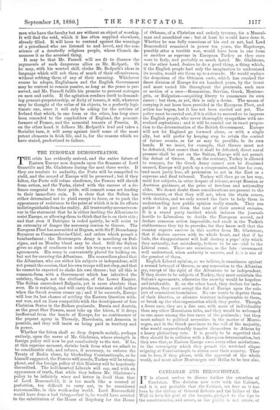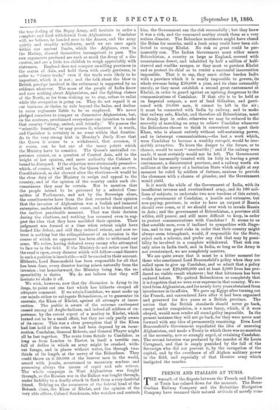CANDAHAR AND BELOOCHISTAN.
IT is almost useless to discuss farther the retention of Candahar. The decision now rests with the Cabinet, and it is not probable that the Cabinet, set free as it has been by the victory of General Roberts and the failure of the Wali to keep his part of the bargain, pledged to the lips to the constituencies, and aware, as the public is not aware, of
the true feeling of the Sepoy Army, will hesitate to order a complete and final withdrawal from Afghanistan. Candahar will, we believe, be handed over to the Ameer, and the army quietly and steadily withdrawn, until we are once again within our ancient limits, which the Afghans, even in the Mutiny, showed themselves incompetent to pass. The new arguments produced are such as mark the decay of a dis- cussion, and are a little too childish to weigh appreciably with statesmen. England does not conquer unwilling provinces in the centre of Asia, and hold them with costly garrisons, in order to "foster trade," even if the trade were likely to be important, which it is not ; and the talk about the blow to British prestige involved in the retirement is supported by no evidence whatever. The mass of the people of India know and care nothing about Afghanistan, and the fighting claims of the North, so far from wishing us to stay, refuse to enlist while the occupation is going on. They do not regard it as our business, or theirs, to rule beyond the Indus, and decline to enter regiments liable to be so employed. We never pledged ourselves to conquer or dismember Afghanistan, but, on the contrary, proclaimed everywhere our intention to make that country "strong, united, and friendly." We possess the "scientific frontier," or may possess it, whatever it is worth, and Candahar is certainly in no sense within that frontier. As to the very strong hint in Monday's Daily News that the Queen is averse to a withdrawal, that aversion, if it exists, can be but one of the many points which the Ministry have to consider. The Queen's unrivalled ex- perience cannot, on a question of Central Asia, add to the weight of her opinion, and mere authority the Cabinet is bound to disregard. If the objection were strenuously pressed— which, of course, it will not be, the Queen being now, as ever, Constitutional, as she showed after the elections—it would be the clear duty of the Ministry to resign and appeal to the country, and of the opinion of the country under such cir- cumstances they may be certain. Not to mention that the people intend to be governed by a selected Com- mittee of Parliament, and not by the Sovereign alone, the constituencies have from the first recorded their opinion that the invasion of Afghanistan was a foolish and immoral enterprise, undertaken without cause, and to be abandoned at the earliest practicable moment. That was their decision during the elections, and nothing has occurred even to sug- gest the idea that they have modified their opinion. Their judgment was formed at a time when retreat might have looked like defeat, and still they ordered retreat, and now re- treat is nothing but the relinquishment of an invasion in the course of which no opponent has been able to withstand our arms. We retire, having defeated every enemy who attempted to face us in the field. If the Ministry do not retire now that. the road is open, every disaster which will follow—and disaster in such a position is inevitable—will be carried to their account. Hitherto, Lord Beaconsfield has been responsible for all that has been done, every disaster having arisen naturally from the invasion ; but henceforward, the Ministry being free, the re- sponsibility is theirs. We do not believe that they wilt hesitate to shake it off.
We wish, however, now that the discussion is dying to its dregs, to point out one fact which has hitherto escaped all adequate comment. If we retain Candahar, we must make up our minds either to subjugate Beloochistan, or to guarantee its suzerain, the Khan of Khelat, against all attempts at insur- rection. The public is aware of the extreme excitement caused among all Anglo-Indians, and indeed all soldiers of ex- perience, by the recent report of a mutiny in Khelat, which turned out to be a small affair, but they are only partly aware of its cause. This was a clear perception that if the Khan had lost hold of the reins, or had been deposed by an insur- rection, Candahar, General Roberts, and General Phayre might all be lost together. The route from Scinde to Candahar, as long as from London to Exeter, in itself a terrible one, full of defiles in which an army might be crushed, with- out forage, and in places without water, lies through two- thirds of its length at the mercy of the Beloochees. They could throw on it 30,000 of the bravest men in the world, armed with jezails, accustomed to mountain warfare, and possessing always the means of rapid and safe retreat. The whole campaign in West Afghanistan was fought through, as the Russian war in the Balkan was fought through, under liability to a deadly attack in flank from a very doubtful friend. Relying on the assurances of the federal head of the Belooch clans, the Khan of Khelat, and the opinion of the very able officer, Colonel Sandeman, who watches and controls him, the Government ran the risk successfully ; but they knew it was a risk, and the rumoured mutiny struck them as a very serious disaster. The Beloochee mutineers might have closed the Bolan for months, until a fresh army could have been col- lected to occupy Khelat. No risk so great could be per- manently run. The Indian Government must either annex Beloochistan, a country as large as England, covered with mountainous desert, and inhabited by half a million of half- starved and warlike savages, or they must so garrison Khelat and so protect its chief as to render a successful insurrection impossible. That is to say, they must either burden India with a province which it is nearly impossible to govern, its whole revenue being £30,000 a year, and its clans untamably unruly, or they must establish a second great cantonment at Khelat, in order to guard against an uprising dangerous to the communications of Candahar. If that city is to be held as an Imperial outpost, a sort of land Gibraltar, and garri- soned with 10,000 men, it cannot be left in the air ; it must be connected with India by railway, and to make that railway safe, Khelat, and therefore all Beloochistan, must be firmly kept in order, otherwise we may be reduced to the necessity of marching an army to relieve Candahar whenever the Beloochees choose to think it convenient to upset their Khan, who is almost entirely without self-sustaining power, and to intercept communications,—the last a work which, were Caudal= to become a wealthy entrepot, would be irre- sistibly attractive. To leave the danger to the future, or to chance, would be most "unscientific ;" and if the railway were made, it most certainly would not be left. The Government would be incessantly taunted with its folly in leaving a great cantonment, a discontented province, and a railway worth six millions at the mercy of a barbarian State which might at any • moment be ruled by soldiers of fortune, anxious to provide the clansmen with a chance of plunder, and the Government would yield.
Is it worth the while of the Government of India, with its insufficient revenue and overburdened army, and its 180 mil- lions of subjects, to undertake two new burdens of this extent, —the government of Candahar, a hostile and extensive, but non-paying, province, in order to have an outpost if Russia should ever come, or if we should ever wish to invade Russia in Asia ; and the government of Beloochistan, a province still wilder, still poorer, and still more difficult to keep, in order to protect communications with Candahar It seems to us that sensible men, even if inclined to sympathise with Jingo- ism, and to run great risks in order that their country might always seem triumphant, would, if responsible for the State, reject such a scheme, and prefer any risk that may by. possi- bility be involved in a complete withdrawal. That risk can only arise in India itself, and in India, so long as the Army is not overstrained, we are completely masters.
We are quite aware that it must be a bitter moment for those who sanctioned Lord Beaconsfield's policy when they are called upon to give up Candahar, and so admit that a policy which has cost £20,000,000 and at least 2,000 lives has pro- duced no visible result whatever ; but that bitterness has been endured before. We quitted Beloochistan so completely that it is forgotten that we were ever supreme in that country. We re- tired from Afghanistan, and for nearly forty years abstained from interference in its affairs. We gave up Egypt after turning out the French, and surrendered Java after it had been organised and governed for five years as a British province. The notion that the British standards should never go back, except under compulsion, is a mere fancy, which, if it were obeyed, would soon render all sound policy impossible. lathe present instance they will not go back, for they were never sent forward with any idea of permanently remaining. Even Lord Beaconsfield's Government repudiated the idea of annexing Afghanistan, and made a Treaty in which there was no mention of the necessity, now so strongly urged, of retaining Candahar. The second invasion was produced by the murder of Sir Louis Cavagnari, and that is amply punished by the fall of. the Sovereign who did not prevent it, by the occupation of the capital, and by the overthrow of all Afghan military power in the field, and especially of that Heratee army which instigated the murder.



































 Previous page
Previous page